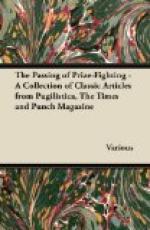* * * * *
IN MEMORY OF DORA.
(A JOYOUS ANTICIPATION.)
Walk very softly here and very slowly;
Let no sound pass the barrier
of your teeth;
Not that the spot whereon you tread is
holy,
But lest you rouse her up
that lies beneath.
She ruthlessly curtailed our golf and
skittles;
She vetoed daily sprees and
nightly jinks;
She doled our baccy and weighed out our
victuals,
And watered (cruellest of
all) our drinks.
Anathema (by order) were our races;
Joy-riding was taboo in car
or train;
And when they ventured to kick o’er
the traces
She strafed her victims till they roared
again.
Now where she sleeps the sleep that knows
no waking
A simply graven sentence marks
the place
(The Latin’s shaky but bears no
mistaking):—
“Hic jacet DORA and
hic let her jace.”
* * * * *
AN UNHAPPY CHRISTMAS.
“A number of persons
have booked dooms for Yuletide.”—Scottish
Paper.
* * * * *
THE BROTHER SERVICE.
MR. PUNCH, DEAR SIR,—I am still with the Q.M.A.A.C.’s at what used to be called the Front. But do not imagine I am cut off from news. Papers from home pour in by every mail. I read articles written by People Who Know, and speeches of politicians to female electors, and that is how I have learned that it is we Women of England who have won the War.
Yet out here one cannot help noticing that the War was not waged entirely by the lovelier sex. And so I am writing to ask you to say a word or two about the work of the Brother Service, the less conspicuous branches of our army, the men who hauled big guns about, who stood in trenches, who looked after ammunition, or who killed mules to provide us with pressed beef. Little bits of the great machinery—hangers-on of the great Women’s Army Corps—yes, but without the humble hairpin the whole coiffure falls to the ground.
I have never been a pessimist
or a scaremonger, but without some of
these men I don’t believe
we women would have won the War at all!
They ought to be encouraged, Mr. Punch. Could you not start a Muscle Competition for the men who helped the women win the War? Something like the Beauty Competitions for us other warriors? Why not offer prizes to the Tommy with the biggest biceps, the Subaltern with the thickest calf, and the Brigadier with the finest abdominal development?
One is so afraid that at the next European crisis the War Office, having learned its history from picture papers, will simply mobilise the women and forget all about the men. Those absurd machine guns with their wobbly legs really need a man’s touch. Besides, it would be so jolly dull without them.
No, the men really helped, and we ought not to forget it.




